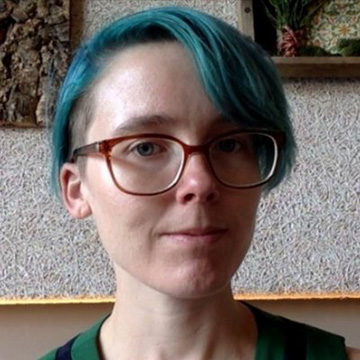PhD Student Alyson Gamble works with Assistant Professor Colin Rhinesmith on a grant-funded research project.

Practitioner-scholar Alyson Gamble is a student in the School of Library and Information Science (SLIS) PhD program. Alyson has been working with Assistant Professor Colin Rhinesmith on a 24-month research project, “Measuring Library Broadband Networks for the National Digital Platform,” which received a leadership grant (award #LG-71-18-0110-18) from Institute of Museum and Library Services (IMLS) this spring. On October 24, the project will be holding their first workshop in Chicago. We spoke to Alyson to get their thoughts on this research project and the PhD program.
Why did you choose to get your PhD?
When I met my advisor Dr. Rong Tang through the ASIS&T New Leader program, I was teaching college students and immersed in scholarship. Dr. Tang was brilliant, kind, and talked to me about my varied interests. She helped me explore these ideas further, which included pursuing a doctorate. My mentors agreed and here I am!
What is your research background?
Being a LIS practitioner is being a researcher. You have to stay on the cutting edge, report your findings and teach others. Additionally, there's some funding for independent research projects and continuing studies. I took advantage of as many of these as possible, which let me research a wide variety of topics, including the history of information science in marine biomedical research.
Like most people in LIS, I was primed for this field by my eclectic background. I became a science librarian, but I started my academic career in liberal arts and wrote two comparative literature theses: one for my English major (BA, Spring Hill College) and one for my first master's degree (MLA, Tulane University). If things would have gone differently in the economy, I probably would have pursued an English doctorate. I’m glad I ended up in LIS, though.
What drew you to Dr. Rhinesmith’s research project?
One of the best things about LIS is how it touches everything — there's always more to learn. I chose the undergraduate institution that I did because of its commitment to social justice and I chose my profession (MLIS, LSU) because of that same dedication. In LIS, contributing to equitable access is what drives my work.
I think of my research as a triangle: one side is biomedical informatics, one side is scholarly publishing, and one side is digital environments. The research with Dr. Rhinesmith involves digital environments and contributes to equitable access. This project allows me to actively learn from Dr. Rhinesmith while working on a project that involves my interests in digital inclusion and community engagement, which had not yet been formally applied to public libraries.
How did your collaboration with Dr. Rhinesmith come about?
This is a brand new area to me in many ways, which is exciting. The opportunity to explore new territory is one of the best things about being a doctoral student. I knew about Dr. Rhinesmith and his work from my colleagues in SLIS. When meeting Dr. Rhinesmith, I found him caring and devoted. As I looked into the Measuring Library Broadband Networks for the National Digital Platform project, it was fascinating to start examining how our broadband structures impact everything, including the digital divide. When I saw Dr. Rhinesmith needed a doctoral research assistant, I checked with my mentors, including my advisor, and then reached out.
What stage of the research are you now in?
We’re preparing for our workshop. Two staff members from each participatory library selected for Year One of the project will attend a one-day, participatory design workshop on October 24, 2018 in Chicago, IL. At this workshop, the staff members will co-design the requirements for the project’s broadband measurement system. The goal of this workshop is to identify the final technical specifications for the pilot measurement system, as well as some of the initial content to be included in the broadband measurement platform training manual.
What advice would you offer current students looking for research projects?
Be creative, be fearless, and be focused — find your research triangle. So many of the opportunities I've had came because I was reading my email and decided to take a chance on what was in the subject line. Also keep in contact with all of the mentors you have in your career — their advice continues to be helpful in locating and navigating new opportunities.
What advice would you offer people considering the SLIS PhD program?
Do it! Well, maybe give it some thought first, and then do it anyway.
